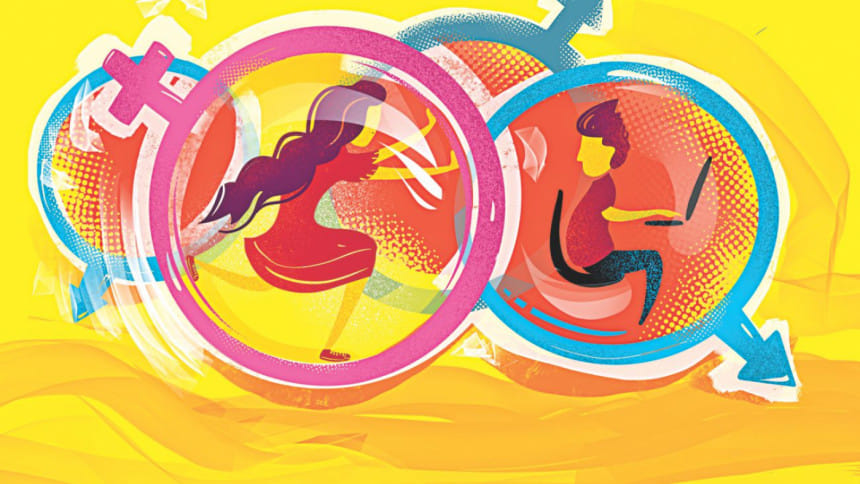How women can drive organisational change in Bangladesh

If you are a woman reading this article, don't put it down just yet because I am a man. The opinions and recommendations I will present here are based on research and advice from some of the top economists, organisational psychologists and business executives in the world, many of them being some of the most influential and successful women on this planet. If you are a man reading this, understand the fact that women driving organisational change isn't mutually exclusive with men driving it. Rather research shows organisations perform significantly better when both forces work together. The recommendations I will present here will help your organisation do just that. Here is how you can support the revolution.
The hidden problem women face when trying to drive organisational change
I won't talk about the social and institutional glass ceilings that stop woman from joining organisations in the first place. I will talk about the hidden hurdles they face once they try to drive change as a member of the organisation. 'Driving organisational change' (different from organisational growth) is mostly associated with 'assertiveness', 'dominance', 'being non-conformist' and 'taking ownership'. Research shows these traits are considered 'masculine' in the society. As a result, when women try to drive organisational change (show these traits), it is considered deviant feminine behavior and thus they face serious social and professional repercussions. Multiple studies show women getting severely penalized for voicing opinions, taking non-conformist initiatives or driving negotiations when their male colleagues get praises for doing the same thing. So, women stop trying. What should they do?
Status before exercising power
There is a silver lining in all of this. In the New York Times best-selling book "Originals", world famous organisational psychologist Adam Grant demonstrates that women don't face repercussions when exercising power or driving change as long as there is a clear proof of their competence and organisational status. Simply put, a woman can only drive organisational change without facing social penalties if she has already shown competence and thus earned status by other means. Examples include leading a top-performing project that drove business growth but wasn't essentially non-conformist, producing insightful research papers, etc.
So, earning status is the first step; gaining power to drive organisational change will follow. However, there are 2 major barriers women face on their path to gaining organisational status. What are they?
Barrier #1
Eminent economics Professor Linda Babcock in her highly acclaimed book, "Women don't ask" shows how the biggest problem stopping women from gaining organisational status is that 'they don't ask'. Meaning they don't ask for promotions, they don't negotiate for higher salaries or they don't take credit for their work, hoping someone will just recognise her work and offer her that. But the recognition doesn't always come in organisations. Thus, this habit can lead an average woman in the USA to earn almost $500,000 less than a man with the same qualifications over the course of a lifetime and get fewer promotions. Why don't women ask? Linda Babcock argues it's because of two reasons:
Firstly, women are socially conditioned from an early age to accept personal conditions as they are and never to question norms around them, even if the norms oppress them.
Secondly, women get penalized if they ask for things since it is considered deviant feminine behavior.
How do we remove barrier #1?
Although this early social conditioning and the fear of getting penalised stop women in most cases to advocate for themselves, research shows that women don't get penalised for advocating for others (because it is considered an ideal feminine communal behavior). As a result, women become very successful and powerful negotiators on behalf of others.
Recommendation for women: Open an all-women group inside your organisation. The members of the group will be responsible for advocating for other female colleagues' salary raises, promotions, etc. The group will keep track of top female performers and negotiate for them in front of the organisational leaders. This will lead to better negotiations, less social penalties, more female promotions and raises.
Recommendation for men: Make sure the male leaders sit down every now and then with the female advocate group to get updates on which women are performing well and thus deserve promotion, without them having to ask for it (and hence getting penalized).
Barrier #2
According to Sheryl Sandberg, COO of Facebook, billionaire and author, a crucial barrier for women in gaining organisational status is the lack of mentoring. All successful personalities have mentors and that's crucial in succeeding. But since there are very few women in top positions, there is no one to mentor the aspiring women in organisations. And thus, they get stuck.
How do we remove Barrier #2?
Female leaders in the organisation should host mentoring sessions to provide promising female talents with the guidance they need.
Recommendation for women: Reach out to the female leaders with specific questions and seek career guidance. Don't just ask them to be mentors; ask them for advice on specific questions and career problems. It's easier and more productive for a mentor to help that way.
Recommendation for men: Chances are that the organisation doesn't have female leaders yet. So, you have to take the role of being a mentor. Instead of waiting for the promising female employees to come to you, reach out to them and guide them.
Top performing organisations in the world actively follow this system to promote growth and transformation. It's time Bangladesh followed suit.
Seeam Shahid Noor is a 2nd year student at Harvard University studying Applied Mathematics and is passionate about inspiring professional development in communities around him. Email him at [email protected] to express opinions, requests and compliments.

 For all latest news, follow The Daily Star's Google News channel.
For all latest news, follow The Daily Star's Google News channel. 



Comments